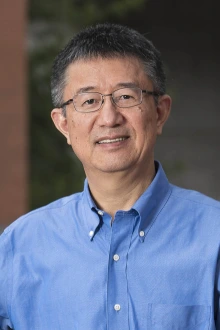Dr. Xinxin Ding Elected Secretary/Treasurer of ASPET Council
Xinxin Ding, PhD, a professor and head of the Department of Pharmacology and Toxicology at the University of Arizona R. Ken Coit College of Pharmacy, was elected secretary/treasurer of the American Society for Pharmacology and Experimental Therapeutics (ASPET) council.
“I am humbled to be elected to the ASPET council, and also excited to have the opportunity to contribute my ideas, diligence and experience to the continued success of ASPET,” said Dr. Ding, who is a member of the BIO5 Institute.

Xinxin Ding, PhD
In his new role, Dr. Ding said he wants to advance ASPET’s strategic goals, one of which is to keep pharmacology at the cutting edge of biomedical research and education. He also wants to welcome new pharmacologists into the profession. “I am particularly enthusiastic about supporting the recruitment and career development of the next generation of pharmacologists,” said Dr. Ding, who is a member of the UArizona Cancer Center and the UArizona Southwest Environmental Health Sciences Center.
Dr. Ding has been the pharmacology and toxicology department head for almost five years. “We have a great department and college, which are undergoing major expansions in research and education programs,” he said. “I truly appreciate the opportunity to be a part of this great team.”
His research focuses on the functions of a family of proteins called cytochrome P450 enzymes. “These enzymes metabolize drugs and other foreign chemicals, as well as endogenous signaling molecules,” he explained. “We are exploring the roles of these enzymes in drug safety and chemical toxicity, as well as in the etiology of major human diseases, such as diabetes and lung cancer. Our goal is to identify factors or situations that can predispose an individual to increased risks of toxicity from drugs and environmental chemicals and to devise therapeutic approaches to prevent such toxicities.”
ASPET’s mission is to be a “professional home for educators, students, researchers, health care practitioners and other professionals working to advance pharmacology research, exchange knowledge and increase the impact and influence of this scientific discipline.” The society’s 4,000 members conduct basic and clinical pharmacological research and work for universities, government, large pharmaceutical companies, small biotech companies and nonprofit organizations.

